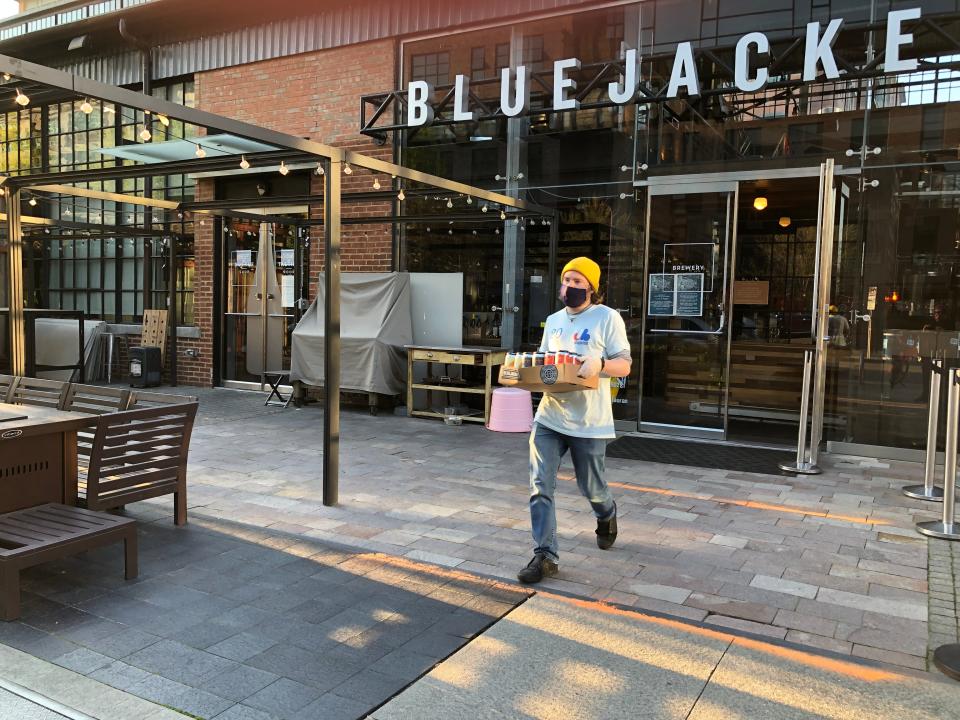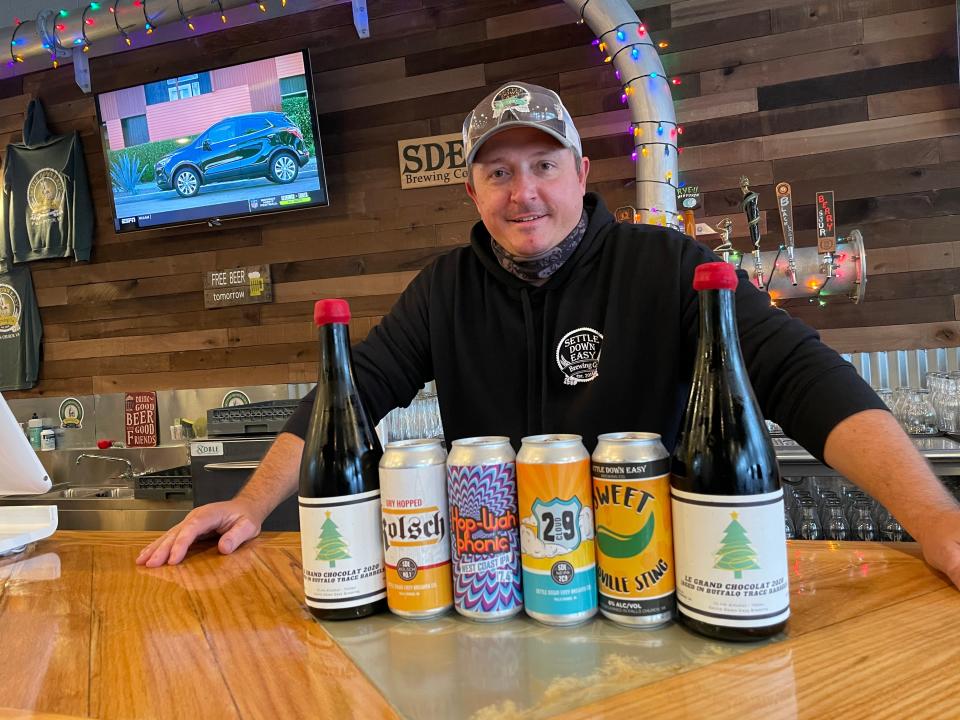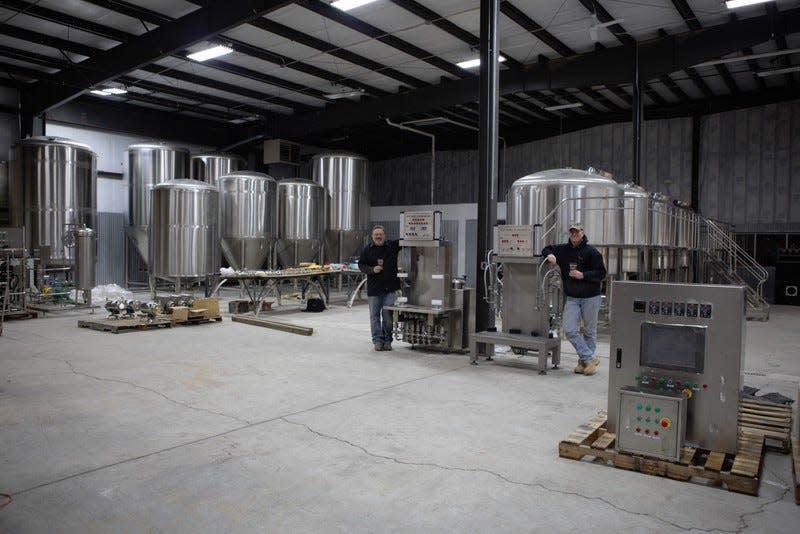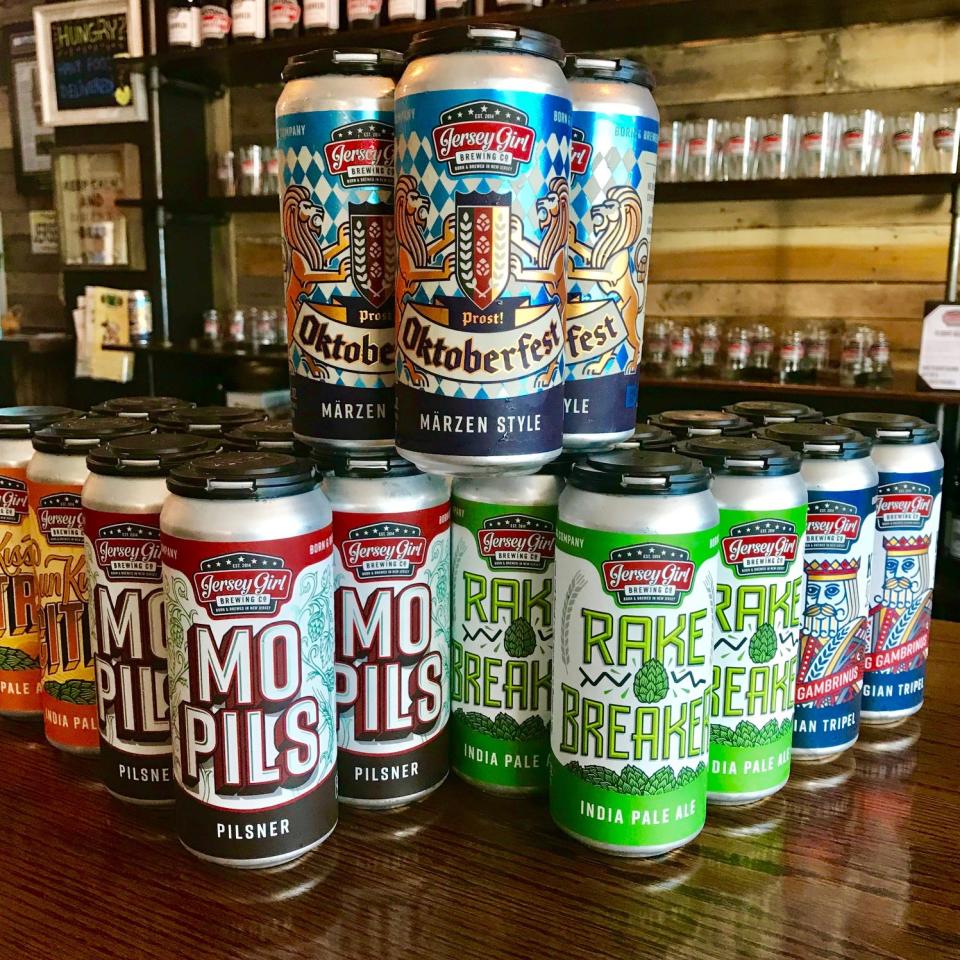Is a beer shortage on tap? Inflation and supply chain pressures on brewers are intensifying
We have endured no shortage of shortages recently. There was toilet paper and computer chips, followed by tampons and baby formula. Could the next shortage involve beer?
The potential arises as beer makers, big and small, are under pressure from a confluence of inflation and several supply chain issues. Some breweries have found it challenging to get carbon dioxide (CO2), which is used to clean tanks and carbonate beer. When they do get it, the price is often higher, sometimes twice what they used to pay.
Also rising: the price of other ingredients such as malted barley and the cost to ship that and other products.
All this could lead to higher beer prices. And, it could result in some of your favorite beers being out of stock or not on tap.
"I don't know if I can think of a scenario where there'd be no beer from a brewery, but I can understand a scenario where there would be a limited or smaller offering, as beer has a short shelf life," said Chuck Aaron, owner and founder of Jersey Girl Brewing in Hackettstown, N.J.
The environment is challenging enough that it could force some breweries to close. "This could certainly be a factor in closures," Bart Watson, chief economist for the Brewers Association, told USA TODAY.
In a mid-year survey of the association's membership – about 5,600 U.S. small and independent breweries – some brewers' sentiments amounted to, "we’re selling as much beer as we were pre-pandemic, but making far less on that beer, and we’re unsure how long that is sustainable," Watson said.
Gas prices go up after declines: Here's where gas is cheapest and most expensive
What's it mean for you?: Fed hikes interest rate 0.75 percentage point to tame inflation
Why could there be a beer shortage?
Because breweries, which are accustomed to some supply chain struggles, face a growing list of headaches. The price and availability of aluminum cans became increasingly volatile as cans became critical to breweries' survival. Many had pivoted to curbside pickup and offsite distribution during the national shutdown brought on by COVID-19.

Similarly, the supply of CO2 has "remained tight since the shortages in the Spring of 2020," Watson said in a recent report. Breweries have often got less than they ordered – or worse, not had promised amounts delivered at all.
Now, inflation has driven up the entire cost of breweries' shopping list, just as it has for all Americans. That means breweries are likely paying more for CO2, cans, paper goods, malt (grains needed for making beer), and hops.
"What’s unprecedented is the number of areas where we are seeing challenges," Watson told USA TODAY.
Some updated PPI numbers for brewery input costs. Not a pretty picture. pic.twitter.com/Pfl2kF0gHm
— Bart Watson (@BrewersStats) September 14, 2022
Inflation: No more steak. Ordering out less. Here's how inflation is squeezing American diets.
Settle Down Easy Brewing Co. in Falls Church, Virginia hasn't been hit hard by CO2 price increases, but is paying an additional two cents per can for its canning line, purchased during the pandemic, said co-owner Frank Kuhns.
But other price increases have hit harder including $150-$300 "gas travel" fees for each delivery from suppliers, and labor and equipment costs of 30% to 40% more than originally budgeted, for the construction of a second Northern Virginia location a few miles away in Oakton, Virginia.
So far, "we have made the decision to hold and not pass these increases onto the customer and instead look for new suppliers or cutting costs without sacrificing quality," Kuhns said.

Despite the dilemma, the nation's beer taps won't likely run dry. But they could be tempered, he said.
"I’m not sure I’d go so far as to say there will be shortages. Individual producers may have issues, but this isn’t so widespread that you’re going to see empty beer shelves," Watson said. "I think the beer brand that consumers want occasionally being out of stock is closer to accurate. And brewers might make different or fewer beers."
Why is carbon dioxide needed to make beer?
Most beer lovers know that brewers use CO2 to carbonate beer. But CO2 also is used to clean fermentation tanks and keep oxygen out before they are refilled. "Oxygen is the devil of beer and will kill a beer if you have oxygen in it," Aaron said.
But many breweries have had a devil of a time getting the CO2 they need. A main contributor is that a natural source of CO2, the Jackson Dome, an extinct volcano in Mississippi, "is facing a contamination issue with the raw gas from the mine creating a significant decrease in available food grade CO," Watson told brewers in a July report.
High demand and some shutdowns at ammonia plants, which create and capture CO2 to sell to other industries, has compounded the shortage. So have rail disputes, which have disrupted deliveries, wrote Forbes columnist Richard Howells, a supply chain executive.
"Yes, you heard right," Howells wrote. "In this era, of trying to reduce emissions of CO2 into the atmosphere, we are actually going to have a shortage of the CO2 that provides the carbonation so loved by millions of concerned beer drinkers."
How are breweries coping with the CO2 shortage?
Most have had to pay more for CO2, while many have had to find alternate suppliers. And if a brewer cannot get enough, that could lead to some beers not getting made, said Tomme Arthur, co-founder and chief operating owner of Port Brewing and The Lost Abbey in San Diego County, California.
"I don't expect the grocery aisles to be missing 18 packs of lager," he said. "But your local craft brewer is certainly at risk for having to adjust brewing schedules and deliverables based on this lack of CO2 and the need for it in so many of the brewing practices."
At Jersey Girl Brewing, the cost has doubled over the the past year, from about 20 cents a pound to 44 cents.
Aaron said he has been "watching the invoice price creep up and up and up as we fill" the brewery's bulk tanks capable of holding 1,500 pounds of the gas.
Aaron has also had to decide not to make some beers, such as a Helles lager, because the German grains needed were too costly with increased shipping prices. And some beers needing New Zealand International hops have not been produced.
"Hopefully once the prices come back in line, we'll be able to reintroduce those into the market," he said.

Earlier this week, Axios reported that a "U.S. beer shortage looms with gap in carbon dioxide supply." It also noted that some breweries have equipment to capture the CO2 emitted in the brewing process, but it is very expensive.
Also vying for CO2: Other industries including carbonated beverage makers and food manufacturers. "As we have learned, brewers are a relatively small user of CO2 in the grand scheme of things," Watson said.
What's everyone talking about?: Sign up for our trending newsletter to get the latest news of the day
Could beer become more expensive?
It already has. The makers of Miller Lite and Coors Light, and Bud Light – as well as Stella Artois – have all raised prices recently. But beer prices are up far less than the cost of production.
The price of beer purchased to drink at home had risen about 5% as of August 2022, compared to August 2021, according to the Consumer Price Index. That's higher than whiskey (3%), wine (2.5%), and other spirits (1.2%).
Another barometer of pricing: The average cost to consumers for beer has risen 3.4%, over the past year for the equivalent of a 24-pack of 12 oz. cans, based on prices for the week ending Sept. 10, 2022, according to Nielsen IQ.
Beer price increases have also remained below that of other consumer goods – overall, prices increased 8.3% compared to a year ago, and food rose 11.4%. Price hikes have not "stopped consumers from trading up to" craft beers, imported beers or canned cocktails and seltzers, said Bump Williams, a beverage industry consultant.
Consumers have also been buying more 12-packs and single-serving cans as they have been "changing their purchase behavior with inflation going up, interest rates going up, gas prices going up, and a declining stock market turning 401k’s into 201k’s," Williams said. "So folks are managing their affordable luxury expenditures a bit differently today."

Could the price of cans also affect beer supply?
Probably indirectly, since aluminum prices are just one of several costs brewers see increasing. Costs of cans "are still much higher than they were and I believe once prices go up the way we've experienced them, you tend not to see them come back down," Aaron said.
While there has been less volatility recently, some breweries had to find a new supplier when Ball Corp., one of the nation's largest can manufacturers, earlier this year raised its minimum requirements for customers, citing unprecedented demand.
"We were sent scrambling to find an alternative supplier," which charges 1.5 cents more per unit, Arthur said. "A truck load of cans is approximately 156,000 units so the pennies add up," he said.
"I have never seen this level of inflationary pressures combined with outright shortages. It's bonkers to put it mildly," Arthur said. "I suspect that nearly every brewery in town is being jammed on the same fronts."
Follow Mike Snider on Twitter: @mikesnider.
This article originally appeared on USA TODAY: Beer: Could there be a shortage? Inflation, supply chain issues remain

 money
money 